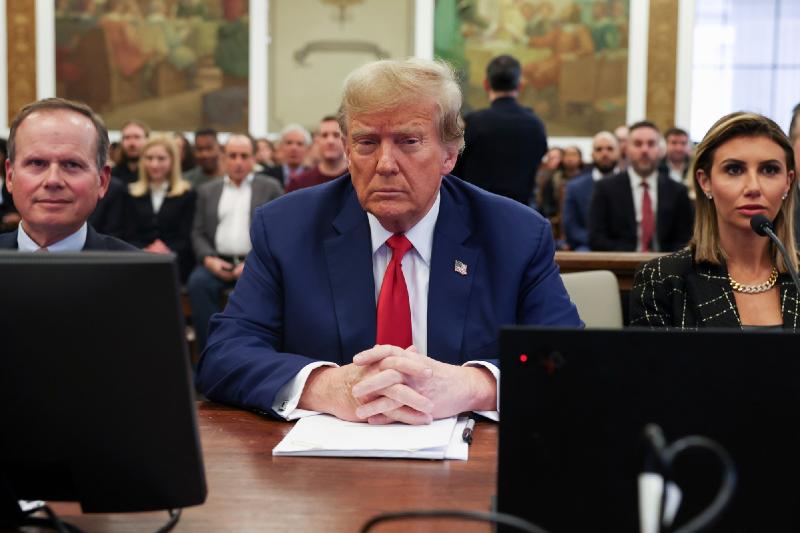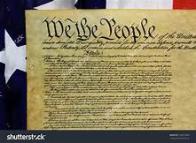Ruth Bader Ginsburg and Trump's $355 million fine - Daily News
By: Susan Shelley (Daily News)

Let me tell you about the time Ruth Bader Ginsburg saved Donald Trump $355 million plus interest.
It was Feb. 20, 2019, and Justice Ginsburg delivered the opinion of the court in the case of Timbs v. Indiana.
In that case, police in Indiana had seized Tyson Timbs' Land Rover SUV, which he bought for $42,000 with money he received from a life insurance policy when his dad died. The state sought civil forfeiture of the vehicle because Timbs had pleaded guilty to drug dealing and conspiracy to commit theft. However, the fine for the crime was only $10,000 and the vehicle was worth four times that. Taking the vehicle was an excessive fine, the judge ruled, and excessive fines are prohibited by the Eighth Amendment to the U.S. Constitution. The Court of Appeals agreed.
But then the Indiana Supreme Court reversed the ruling on the grounds that the Eighth Amendment's prohibition on excessive fines applies only to the federal government, and it does not bind the states.
Yes it does, the U.S. Supreme Court said unanimously. Justices Neil Gorsuch and Clarence Thomas wrote separate concurring opinions stating that they would have arrived at the decision through different reasoning. But the conclusion was the same.
"There can be no serious doubt that the Fourteenth Amendment requires the States to respect the freedom from excessive fines enshrined in the Eighth Amendment," wrote Gorsuch.
"The Eighth Amendment's prohibition on excessive fines applies in full to the States," wrote Thomas.
"The Excessive Fines Clause traces its venerable lineage back to at least 1215," wrote Ginsburg, "Magna Carta required that economic sanctions 'be proportioned to the wrong' and 'not be so large as to deprive [an offender] of his livelihood.'"
Timbs v. Indiana was a landmark decision. It was the first time the Supreme Court had held that the Eighth Amendment's excessive fines clause applied to the states. Just nine years earlier, in McDonald v. Chicago, the Supreme Court had acknowledged in a footnote, "We never have decided whether … the Eighth Amendment's prohibition of excessive fines applies to the States," pointing to the 1989 case of Browning-Ferris Industries of Vt., Inc. v. Kelco Disposal, Inc., in which the court declined to decide the issue.
McDonald v. Chicago was itself a landmark decision. In that case, the Supreme Court said for the first time that the Second Amendment applies to the states as well as to the federal government.
"When ratified in 1791, the Bill of Rights applied only to the Federal Government," Justice Ginsburg wrote.
How that eventually changed is a little-known part of U.S. history that is about to protect former President Trump from the state of New York.
The Fourteenth Amendment was added to the Constitution after the Civil War, in 1868. It read, in part, "No state shall make or enforce any law which shall abridge the privileges or immunities of citizens of the United States; nor shall any State deprive any person of life, liberty, or property, without due process of law; nor deny to any person within its jurisdiction the equal protection of the laws."
However, this did not immediately make the Bill of Rights applicable to the states. That change began more than 50 years later, in 1925. In the case of Gitlow v. New York, the Supreme Court floated the idea that freedom of speech and of the press are assumed to be "among the fundamental personal rights and 'liberties' protected by the due process clause of the Fourteenth Amendment from impairment by the states."
Gradually over the next century, the court would pick and choose provisions of the Bill of Rights, declare them to be "fundamental" or "deeply rooted" in our history, tradition and "scheme of ordered liberty," and make them binding on the states. (The history of this process can be read in Justice Samuel Alito's opinion for the court in McDonald v. Chicago.)
The Eighth Amendment reads, "Excessive bail shall not be required, nor excessive fines imposed, nor cruel and unusual punishments inflicted."
The "cruel and unusual punishments" clause was declared applicable to the states in 1962, in Robinson v. California. The "excessive bail" provision has applied to the states since the 1971 case of Schilb v. Kuebel. And the "excessive fines" prohibition has been binding on the states since the 2019 Timbs case.
New York Judge Arthur F. Engoron fined the former president and 2024 frontrunner an astronomical $355 million plus $100 million (and counting) in interest. Engoron also prohibited the Trump Organization from taking loans from financial institutions that do business in New York for three years, and he banned Trump personally from working as a director or officer of any corporation or entity in New York for the same period. Engoron even refused Trump's request for a 30-day extension of the due date to pay the fine, which New York requires before he can appeal the judgment.
This was a civil fraud trial, without a jury, in which the judge found Trump guilty of giving his assets a too-high valuation to get good loan terms, even though the bank adjusted those values downward before approving a loan that was paid back fully and on time, with interest.
"For good reason, the protection against excessive fines has been a constant shield throughout Anglo-American history: Exorbitant tolls undermine other constitutional liberties," wrote Ginsburg. "Excessive fines can be used, for example, to retaliate against or chill the speech of political enemies."
New York Attorney General Letitia James campaigned on a promise to sue Donald Trump, calling him an "illegitimate president." She said she'll ask the court to seize Trump's buildings if he can't come up with hundreds of millions of dollars in cash in time to pay the fine.
We'll see. It may be easier to go up against Trump than to argue with Ruth Bader Ginsburg.
Trolling, taunting, spamming, and off topic comments may be removed at the discretion of group mods. NT members that vote up their own comments, repeat comments, or continue to disrupt the conversation risk having all of their comments deleted. Please remember to quote the person(s) to whom you are replying to preserve continuity of this seed.
No Fascism References, Memes, Source Dissing.





If she knew it would help Trump............................but the law is the law.
It seems the language in the seeded article is a bit loose. Furthermore, the cited case is distinguishable from Trump's case.
In the case cited, the defendant pled guilty to a crime. The civil forfeiture action sought payment for the fine imposed in the criminal case. It was held that the value of the seized vehicle was greater than the amount of the criminal penalty and was, therefore, inappropriate as excessive.
Trump's case did not involve a criminal prosecution or a finding of guilt. The judge did not find Trump "guilty". Instead, Trump was found liable for damages for civil fraud, and as a result, a disgorgement of assets obtained through his fraudulent misconduct was ordered. I have not read the entire opinion in the Trump case, but I question whether the judge ever used the word "fine".
In any event, an order for payment of damages proved up in a civil case would not be considered excessive under the Eighth Amendment. However, it could possibly apply to punitive damages awarded in a civil case.
The "provable damages" were subjective at best and calculated by the judge's/prosecutor's choice. No one got hurt or they would have brought charges years ago. Everyone got paid. It's bogus at best................and you and everyone else knows it. This "opinion" has been overlooked forever and only because of the Trump name, is it now "fraud".
You may have your opinion about the rationale behind the case and the amount of the judgment, or even the fact of a judgment, but that doesn't change the fact that the seeded article is inapposite and the "excessive fine" argument is inapplicable.
As for a subjective opinion, you and everyone else knows full well that the amount of the judgment against Trump was completely appropriate.
No no it wasn't. All politically driven. And you know it being an attorney. Would you accept it as his counsel?
It's an attorney's ethical obligation to be a zealous advocate on behalf of their client's interests. In that context, my personal opinion would be irrelevant.
As for my personal opinion aside from that -- GUILTY!
$455million guilty with the ridiculous amount prior to letting an appeal be instituted? Wait till the SCotUS gets hold of this.
There have been plenty of judgments bigger than that.
New York law apparently requires that the amount of the judgment, plus, be posted in order to maintain an appeal. You wouldn't want Trump to be granted more favorable treatment than any other citizen, would you?
SCotUS might not even take up the case, or do you expect (hope) that a group of highly partisan right wing judicial legislators will come to the rescue of their Dear Leader?